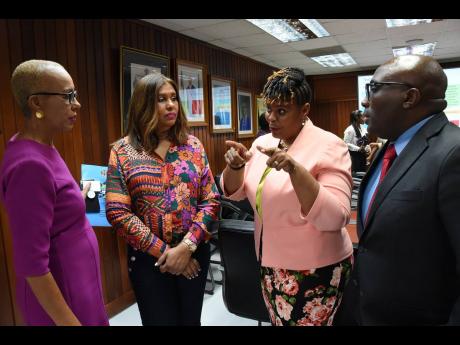Resource, parental shortfalls dampening morale, say teachers
Low levels of parental involvement in education and general inadequacy of resources and equipment are among issues identified by educators as contributing to low levels of motivation.
But the majority – or 87 per cent – of educators said they remain passionate about teaching, despite the issues confronting education and the socioeconomic issues and challenges facing Jamaica that impact the education system.
The findings are contained in a national teachers’ consultation report, which outlined challenges and recommended a raft of changes and approaches for defining a new education landscape for Jamaica.
Teachers Assess and Reimagine Jamaica’s Education System is in support of the development of Jamaica’s commitment statement to the United Nations’ Transforming Education Summit (TES), which will take place in New York this month.
The views of 930 teachers were captured through six online consultations – a quantitative survey and a situational analysis of the education sector.
Of that number, 53.3 per cent were early childhood educators, while 46.7 per cent were primary, secondary or special education teachers.
Close to 30 per cent of the participants were from urban areas and 66 per cent from rural areas.
Teachers pointed to the importance of partnership between teachers and parents in achieving learning outcomes.
“Parents are often in denial about their children’s learning abilities, making it difficult for teachers,” one teacher said.
While the educators consider themselves key to enabling the achievement of learning outcomes, they said parental involvement would help to foster performance.
The teachers reasoned that some focus must be placed on building the capacity of parents and sensitising them to their role in their children’s education.
In their assessment of inclusiveness and equity, teachers said they wanted improvements in the assessment processes to support children with learning disabilities. They explained that in almost every classroom there are students with special needs, but their needs are not being effectively met, owing to limited resources.
The educators also called for emphasis to be placed on children who are gifted through the creation of accelerated learning programmes.
Further, educators said there needs to be equity and access in human, learning, teaching and information technology resources as primary schools in rural areas need to mirror primary schools in urban areas.
Teachers also shared that there is a need for better targeting of social protection programmes such as the Programme of Advancement Through Health and Education (PATH), for those who need it most.
Jamaica Teachers’ Association (JTA) President La Sonja Harrison said that she heard the heart of her colleagues as the findings were being presented by UNICEF TES consultant, Elizabeth Emanuel.
“I noted that the teachers’ focus was not necessarily on their salaries. It is important, but it was not their focus. They are committed to nation-building. They need professional courtesy and the dialogue to continue. We want to be at the table to guide and shape policies, to remove the tentacles of colonialism, and to ensure that our curriculum is ‘STEAMified’ and ICT-driven,” Harrison said.
STEAM education is an approach to learning that uses science, technology, engineering, the arts, and mathematics as access points for guiding student inquiry, dialogue, and critical thinking.
The JTA president also agreed with the educators surveyed, who recommended a national campaign focused on the value of education “so that all stakeholders, in particular our parents, can know the valuable role that they play – the integral role; they must be that support system and concretising of whatever the teacher does in class at home – and for the human, financial and infrastructural resources of our schools to be improved,” she added.

